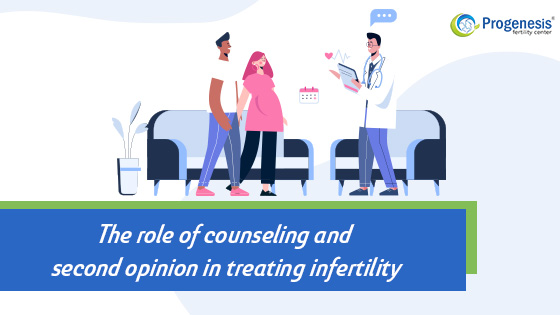According to the World Health Organization, infertility affects up to 15% of reproductive-aged couples worldwide. And as the number grows, the need and urgency to better understand and resolve these issues keep rising.
This is when infertility counseling comes into the role. The following blog aims to give you detailed information on the topics of:
What is fertility counseling?
- Replacing Infertility Misconceptions with Positivity
- When should a couple visit a fertility counselor?
- How does fertility counseling help?
- What happens during the process of fertility counseling?
- How can a second opinion help in treating infertility?
What is fertility counseling?
Fertility counseling allows the couples to share any emotional issues, fears, or anxieties they might experience during their journey of becoming parents. This initial step helps evoke transparency between the doctor and the patient.
During the session, the issues faced by couples are discussed, after which they are made aware of their problems and the treatment options available. The session further assists couples in better understanding the treatment process that can help overcome their particular problem.
Replacing Misconceptions with Positivity
Infertility is not commonly discussed, especially in India, because there are still many taboos around infertility and assisted reproductive technology.
As a result, individuals often fail to express their feelings or discuss the problems bothering them.
“Having open and honest dialogues will not only make things easier, but it will also allow you to see a plethora of positive choices that might otherwise go overlooked and infertility counseling does the exact needed,” says Dr. Narhari Malgoankar, Chief IVF consultant at Progenesis fertility center.
When should a couple consult a fertility expert?
According to Dr. Malgoankar, “A good rule of thumb says couples under the age of 35 who have failed to conceive after 12 months of regular, unprotected intercourse during peak ovulation cycles should seek assistance.”
Couples are most likely to seek fertility counseling:
- If they are experiencing constant preoccupation with infertility
- Having difficulty with “scheduled” intercourse
- Before they seek any fertility treatment, counseling helps couples cope with infertility and learn about treatment options.
- After an unsuccessful IVF treatment – mostly in cases of multiple IVF failures or second opinion.
- Couples trying to conceive
How does fertility counseling help?
It is necessary to understand that infertility can be a long-term emotionally draining process.
“Fertility counseling can assist patients in working through their emotions and finding ways to cope with their uncertainties,” states Dr. Narhari Malgoankar
In a nutshell, fertility counseling helps patients:
- Process their emotions.
- Deal with stress and possibly traumatic events
- Helping patients consider the next steps or treatment options offered to them.
What happens during the process of fertility counseling?
Fertility counseling is mostly determined by the patient’s reason for seeking fertility counseling, as well as the stage of the process.
Dr. Malgoankar mentions, “If a couple is just starting their journey to have children, fertility counseling will typically focus on helping them accept their situation, understand what will happen next, correct any misconceptions they may have about their fertility issues, and work to eliminate any unhelpful feelings of self-blame and guilt.”
Patients who come later, for example, if they are struggling with repeated IVF failure, failed IUI cycles, fertility counseling, or opting for a second opinion can definitely help.
How can a second opinion help in treating infertility?
In most cases considering a second opinion can help you decide if the treatment you are receiving is appropriate for your particular situation. If the second opinion is the same, it can reassure the person and reduce anxiety. If it differs, options can be weighed to get an assured result.
It is important to know that there is support available if you are struggling to cope throughout your fertility journey.
Dealing with emotions during this phase can be overwhelming. Couples often feel depressed, stressed, or emotionally vulnerable. As a result, they must receive proper counseling and understand the fact that today, with the advancement of technology, the treatment of infertility is possible, the only thing that the patient must have are POSITIVITY and HOPE.

